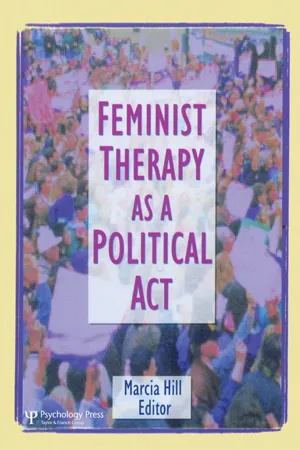![]()
Putting Politics into Practice: Feminist Therapy as Feminist Praxis
Jeanne Marecek
Diane Kravetz
Jeanne Marecek, PhD, is Professor of Psychology and head of Women’s Studies at Swarthmore College. Diane Kravetz is Professor of Social Work at the University of Wisconsin-Madison. She has served as Director of the School of Social Work and chair of Women’s Studies.
This article was written while Jeanne Marecek was a Fellow at the Swedish Collegium for Advanced Study in the Social Sciences in Uppsala; she gratefully acknowledges SCASSS’s support.
Address correspondence to: Jeanne Marecek, Department of Psychology, Swarthmore College, 500 College Avenue, Swarthmore, PA 19081–1397.
SUMMARY. A distinctive feature of feminist therapy is its insistence on bringing power into discussions of therapy and mental health. Using the framework of discourse analysis, we ask how feminist therapists talk about power. What linguistic resources do they employ to construct accounts of power in therapy? Drawing on interviews with three experienced feminist therapists, we trace how their language practices highlight some dimensions of power and conceal others. The diversity in these interviews points to the heterogeneity of feminist therapies. Although some feminist therapists are now calling for standardization, we argue that the field will be better served if diverse ideas and discourses are brought into abrasive interaction.
[Article copies available for a fee from The Haworth Document Delivery Service: 1-800-342-9678. E-mail address:[email protected]] Feminist therapy was conceived in the early 1970s in the oppositional spirit of the Women’s Liberation Movement. Now, nearly 30 years later, feminist therapy—like feminism itsell—has grown into a welter of approaches, ideas, politics, and practices (cf. Enns, 1997). One remnant of its original anti-establishment flavor persists: Feminist therapy remains for the most part outside the academy, its voluminous writings mostly outside the canon of the mental health professions (Brown, 1994; Marecek, 1993). Marginality has some advantages, as Laura Brown (1994) has pointed out. But it has drawbacks as well. One is the scarcity of systematic examination and exploration—even simple descriptive studies—of feminist therapy process or outcome, and of feminist therapists themselves.
In her call for papers, Marcia Hill, the editor of this volume, reminded us that “[f]eminist therapy by definition includes a political consciousness.” “But,” she went on to ask, “how is it that feminists politicize their work?” Working within a social constructionist framework, we pose her question in a slightly revised form: In their narratives about their work, how do feminist therapists address its political dimensions? What are the categories and terms by which power enters therapists’ talk about therapy? In short, how do feminist therapists politicize (and perhaps on occasion depoliticize) their work through their language practices?
Neither institutionalized psychology nor psychiatry—the primary knowledge bases for most psychotherapy practice—has developed a language for talking about power. Indeed, both have been woefully reluctant to theorize how societal, institutional, or even interpersonal power differences might be connected to psychological distress and disorder (Kitzinger & Perkins, 1993). From the beginning, however, feminists have insisted on bringing power into discussions of therapy and mental health (e.g., Chesler, 1972). Without a hegemonic theory constraining them, feminist therapists have been able to draw upon many disparate concepts and language practices to theorize power.
For social constructionists, language practices create the objects of which we talk. Language is not a vehicle for expressing private and unique thoughts formulated inside a speaker’s head; it is a social practice. As Potter (1996) says, “the terms and forms by which we achieve an understanding of the world and ourselves are … products of historically and culturally situated interchanges among people.” These terms and forms—variously called discourses, interpretative repertoires, or consensual discursive practices—are systems of statements that cohere around meanings and values so habitual and familiar that they neither draw attention to themselves nor seem to demand analysis. They serve as rhetorical resources that enable speakers to construct accounts of themselves and the world that are intelligible and meaningful to listeners.
In this paper, we explore the interviews of three experienced feminist therapists drawn from a large set of interviews we have collected. The interviews serve as an arena where we can identify and explore some language practices of feminist therapists and also get at some of the meanings they generate. The therapists whose interviews we chose are typical of the larger group: they are white and middle class; their therapeutic approach is eclectic, drawing on a wide range of techniques and orientations. They are relatively experienced: each has at least 14 years of psychotherapy practice. We do not claim that these therapists are statistically representative of feminist therapists in general. Nor do we want to argue that three interviews exemplify specific categories of feminists or schools of feminist therapy. Our focus is on shared language practices and inter-subjective meanings, not individual people. We seek to examine some discourses and terms available to feminist therapists for constructing accounts of their work. Analyzing the accounts farther, we examine how these language practices highlight some meanings of power while concealing others.
METHOD
The interviews were conducted in the spring and summer of 1996 as part of a larger study. The interviewers were social work graduate students participating in a course on qualitative research methods. To recruit participants, feminist therapists who were known to the authors or the interviewers were contacted to request their participation and to generate the names of other therapists who might qualify for the study. Potential participants were contacted by telephone. This contact served both as an invitation to take part in the study and a screening interview to determine if the therapist was eligible. In the screening interview, we asked potential participants if they considered themselves to be feminists and if they brought a feminist perspective to their practice of therapy/counseling. We let potential particip...
